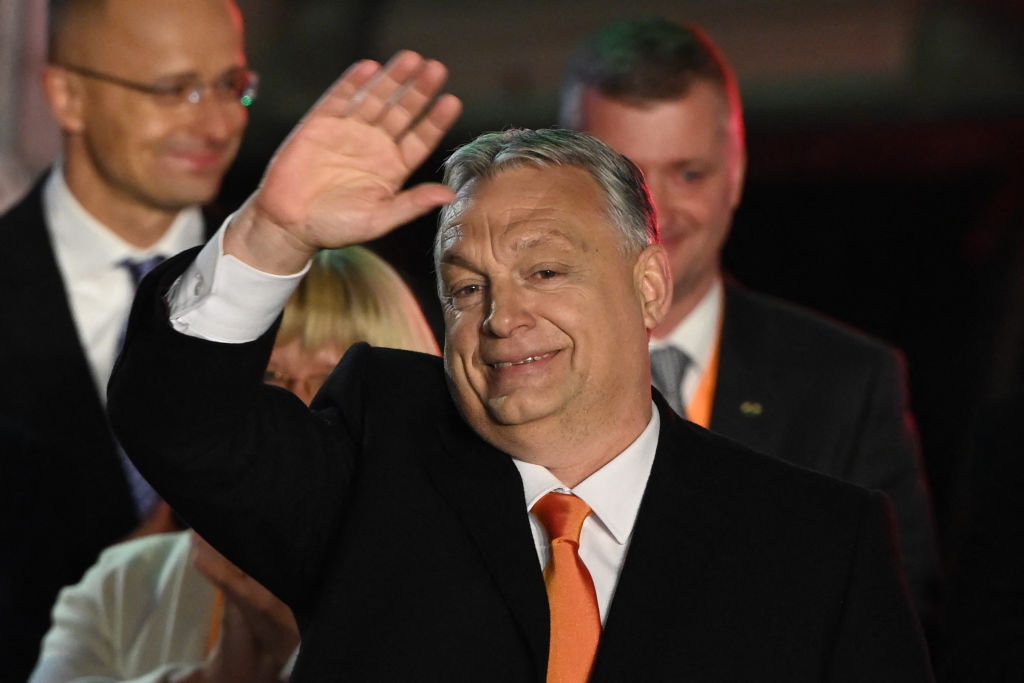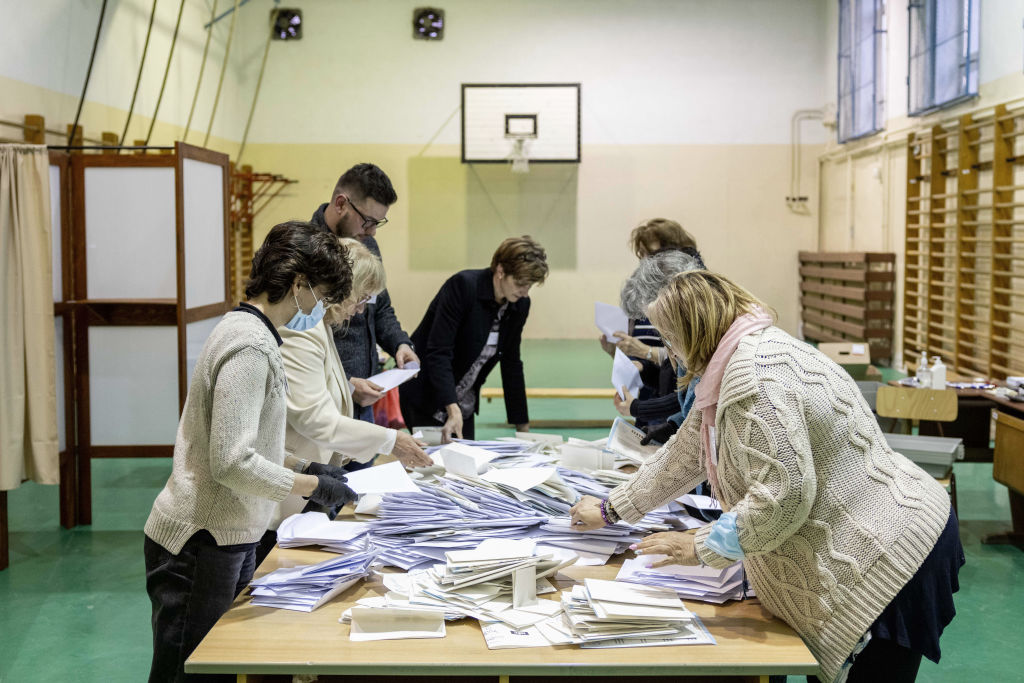
His forces may be bogged down in Ukraine, but Vladimir Putin was handed a boost Sunday. Hungarian Prime Minister Viktor Orban—the Russian President’s closest friend inside the E.U. and NATO—is on track to win a fourth successive term, with more than 80% of votes counted.
Vote counting began after polls closed at 7 p.m. local time with Orban, 58, set to win a strong majority of the total 199 parliamentary seats. “We’ve won a victory so big that you can see it from the moon, but you can certainly see it from Brussels,” Orban told his supporters Sunday evening, nodding to tensions with E.U. leaders.
“We will remember this victory until the end of our lives because we had to fight against a huge amount of opponents,” he said, citing enemies including the international media, the Ukrainian president, and the Hungarian left.
Read More: The E.U. Is United Against Russia—With One Notable Exception
It was an election that was supposed to be dominated by Hungary’s woeful healthcare system following a dire pandemic response—the nation suffered 5,217 COVID-19 deaths per million people, the second highest rate in Europe. But in the end, it turned on the war in neighboring Ukraine.
Challenger Peter Marki-Zay, 49, campaigned on bringing the landlocked nation of almost 10 million people closer to the E.U. and highlighting Orban’s close historic links with Putin. Orban, in turn, campaigned on keeping Hungary out of the Ukraine war entirely—avoiding, he argued—much of the economic fallout that European nations are set to bear for standing tall against tyranny. In the end, Orban prevailed, though the future looks tough for the victor.
“Orban is isolated and will have a very difficult time in Europe [following] the election,” says Andras Bozoki, professor of political science at the Central European University in Vienna. “Because everybody knows him, his pragmatism and opportunism, it’s not like anyone believes that he will be a better guy.”
Meanwhile, in Serbia, one of the few other pro-Russian leaders in Europe, President Aleksandar Vucic, also appeared poised to claim election victory with a strong majority. Serbia is not in the E.U., but is going through the process of joining.
Hungary is a deeply polarized society with less-educated, rural voters typically backing Orban, and more highly-educated urbanites favoring the opposition. It was always going to be a test of who could mobilize their base and entice the 10-15% undecided running into the final weekend. Turnout was estimated to be as high as 70%.
Despite a population that is adamantly pro-E.U., Hungary’s government under Orban has strongly leaned toward the Kremlin. Whereas Orban’s international messaging emphasized Hungary’s neutrality, domestic state media has been parroting Putin’s justification for the invasion. Orban has refused to denounce Putin by name, but instead only opposes “war” in Ukraine. He has also refused to allow NATO weapons to be transported through his territory to Ukraine. Although Orban didn’t oppose E.U. sanctions on Russian kleptocrats or institutions, he has vowed to block any targeting of Russian oil or gas.
Orban is also a significant security risk for allies. According to an investigation by Direkt36, a Budapest-based non-profit investigative journalism center, Russia’s Federal Security Service (FSB) had completely compromised Hungary’s Foreign Ministry computer network and internal correspondence by mid-2021, and the breach remained active during recent E.U. and NATO crisis summits.
Foreign Minister Péter Szijjártó has not publicly complained about the cyberattack, and on Dec. 3 he received the Order of Friendship medal—Russia’s highest state honor for a foreigner—in Moscow on the orders of Putin himself.
“I am proud that, despite the extremely unfavorable global and regional developments … we have also been able to maintain our cooperation with Moscow based on mutual trust and in line with our national interests,” Szijjártó wrote on his Facebook page.

Still, Orban’s victory doesn’t mean he has the full backing of Hungarians when it comes to support for Putin. “Orban knows that the overwhelming majority of younger Hungarians are pro-E.U. and against Russian aggression,” says Carolina Plescia, assistant professor in the department of government at the University of Vienna. “So in a sense, Orban cannot push this much more than he’s already doing.”
Around 20,000 independent election monitors were dispatched to ensure the ballots were cast and counted in a free and fair manner. But even before the first vote was cast, it was clear this would be an uphill challenge for Marki-Zay, a political neophyte whose only public role to date was as mayor of Hódmezővásárhely—a city of 44,000 whose name translates as “Beavers’ Field Marketplace.” He ran as an independent backed by six opposition parties.
The deck was stacked against Marki-Zay, who had previously worked in Canada and the U.S., initially as a door-to-door salesman, and campaigned on Christian family values. Whilst election rules typically afford all candidates equal public television time, the father-of-seven was only granted five minutes on state-owned broadcaster M1 the entire campaign, whilst Orban was constantly broadcasting his manifesto guised as news reports.
Government information posters were also indistinguishable from campaign material for Orban’s Fidesz party. There are few mainstream newspapers, radio stations or television channels that have not been bought up by Orban allies. “The media environment and campaign finances were extremely imbalanced,” says Jennifer McCoy, an Eastern Europe specialist at Georgia State University.
Read More: Hungary Is Sliding Toward Authoritarianism. Can the Mayor of Budapest Save It?
Corruption and nepotism are rife in Hungary, where Orban is shielded by a cabal of oligarchs who have grown obscenely wealthy on the back of government ties. Hungary’s richest person is Lorinc Meszaros, a childhood friend of Orban. He had worked as a gas fitter in their hometown of Felcsut, but is today worth an estimated $1.4 billion. In 2017, his flagship company, Konzum Nyrt, was the world’s best performing stock, thanks to a continuous stream of state contracts. “God, luck, and Viktor Orban certainly played a role in what I’ve achieved so far,” Meszaros said in 2014.
While Marki-Zay campaigned on stamping out graft, Orban offered even more populist policies. In February, he reinstated a 13th month of income for pensioners—a key block of 2.5 million people, or one-third of voters. In addition, Hungarians under 25 have been exempted from personal income tax. Soldiers and police officers got salary hikes of 10%, while parents with children got tax refunds. Members of a menial “public worker” scheme for the unemployed received a pay boost of €270 ($300) per month.
The University of Vienna’s Plescia says she was surprised how little role the economy played in the election—given the gravity of problems coming down the pipeline. The nation’s budget deficit swelled to 8.1% of GDP in 2020 amid the pandemic, with inflation reaching an almost 15-year high of 8.3% in February. “Orban was effective at manipulating the media into not talking so much about economic problems, so that the Ukraine war became the number one issue of the campaign.”
Under Orban, Hungary has been ostracized, and effectively kicked out of the European People’s Party (EPP) grouping within the European Parliament. His attempts to form an alternative right-wing bloc of populist parties with Poland’s PiS party and the Lega Nord of Italy’s Matteo Salvini also failed. He has even been sidelined by the Visegrád Group, a cultural and political alliance comprising the Czech Republic, Hungary, Poland and Slovakia to advance military, cultural, economic and energy co-operation. “He’s isolated within Europe,” says McCoy.
A victory for Marki-Zay would have been blanket bad news for Putin, given the opposition candidate said he would go along with whatever measures the E.U. decided in implement, presumably including transporting arms. He also wanted to close down the Russian-backed International Investment Bank, a multilateral development bank for Eastern bloc states, which was founded by the Soviets in 1970 but which moved headquarters from Moscow to Budapest in 2019. It has been accused of espionage. Following the Ukraine invasion, the Czech Republic announced it would accelerate its planned withdrawal, and Romania started the exit process. Marki-Zay also said he would review the planned expansion of the Paks Nuclear Plant, which is being funded by Russia’s nuclear power company, Rosatom.
Although good news for Putin, Orban’s victory spells significant problems for Hungarians. In February, the European Court of Justice threw out a legal challenge from Hungary and Poland regarding a “rule of law conditionality” that links E.U. funds to member states’ respect for democracy. Due to Orban’s self-trumpeted “illiberal” tendencies, Hungary is now due to lose subsidies equivalent of around 3%-6% of GDP at a time when its economy is facing serious headwinds.
As Bozoki at Central European University says, Orban was “lucky that he [could] position himself as the defender of peace and safety at the time of war in a neighboring country. After the COVID-19 pandemic, Orban will face a real enemy (after so many imaginary enemies): The shadow of economic crisis.”
More Must-Reads from TIME
- Cybersecurity Experts Are Sounding the Alarm on DOGE
- Meet the 2025 Women of the Year
- The Harsh Truth About Disability Inclusion
- Why Do More Young Adults Have Cancer?
- Colman Domingo Leads With Radical Love
- How to Get Better at Doing Things Alone
- Michelle Zauner Stares Down the Darkness
Write to Charlie Campbell at charlie.campbell@time.com